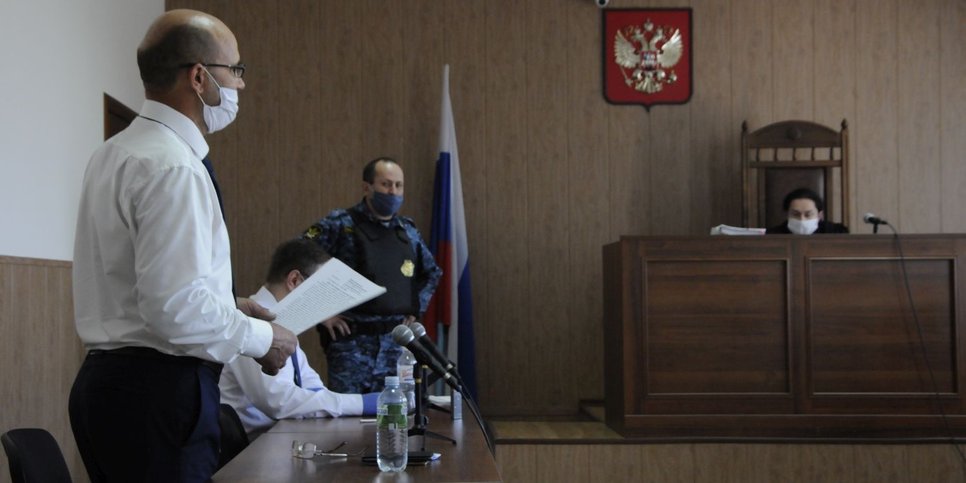Photo: Yuriy Zalipayev in the courtroom
Photo: Yuriy Zalipayev in the courtroom
An acquittal verdict - for the first time in three years - handed to one of Jehovah's Witnesses. Yuriy Zalipayev of Kabardino-Balkaria found not guilty
Kabardino-BalkariaOn October 7, 2020, Elena Kudryavtseva, judge of the Maysky District Court of Kabardino-Balkaria, acquitted Yuriy Zalipayev, recognizing the accusations of incitement to extremism as unproven. The unfair criminal prosecution of the believer lasted more than 4 years. If the prosecutor's office does not appeal the verdict, it will come into force.
"I am very happy and grateful to everyone who defended my freedom. I saw from family members, from my friends, that they were preparing for the worst. And it weighed on them. It is very pleasant that the court approached this case in a principled and unbiased manner and revealed all the pros and cons," said Yuriy Zalipaev after the verdict was announced.
In August 2016, law enforcement agencies broke into the worship building of Jehovah's Witnesses in Mayskoye and planted literature included in the federal list of extremist materials. The fact of falsification was confirmed by video recordings from the scene and witnesses interrogated in court. The evidence was presented to the court during the consideration of the case of an administrative offense, but the court ignored it and awarded the believers a large fine. The decision in the administrative offense case was one of the steps in the liquidation of all legal entities of Jehovah's Witnesses and in the criminal prosecution of Yuriy Zalipaev: less than a year later, a criminal case was initiated against him under two articles: "public calls for extremist activities" (part 1 of article 280 of the Criminal Code of the Russian Federation) and "incitement of hatred or enmity" (part 1 of article 282 of the Criminal Code of the Russian Federation).
Guilty without proof
According to prosecutors, Zalipayev distributed banned literature and encouraged other Jehovah's Witnesses to use violence against members of other religions in the area where he lives. During the trial, neither the prosecutor nor the police officers named as witnesses presented any evidence of these accusations, stating that they were not aware of any violence by Jehovah's Witnesses at all.
On January 23, 2019, the Maysky District Court terminated the criminal proceedings on charges of inciting hatred and enmity (Part 1 of Article 282 of the Criminal Code of the Russian Federation) due to the prosecutor's refusal to charge this part. The court recognized the believer's right to rehabilitation, including compensation for moral damage and legal expenses. The prosecutor's office appealed this decision, but the Supreme Court of Kabardino-Balkaria upheld it. However, Zalipayev continued to be prosecuted under Article 280 of the Russian Criminal Code.
It is noteworthy that on June 4, 2019, the court appointed a psychological and linguistic religious examination in the case of the believer at the Russian Federal Center for Forensic Examination under the Ministry of Justice of Russia. According to the experts' conclusion, "in [Yuriy Zalipaev's] statements ... there are no calls, demands for the commission of any actions, including hostile, violent, discriminatory"; "Statements ... are not characteristic of the personality of Zalipaev Y. V.", they "do not reflect the worldview of Jehovah's Witnesses" and "the practice of the movement of Jehovah's Witnesses".
Yuriy Zalipayev's lawyer Anton Omelchenko, addressing the court during the debate of the parties on September 21, stated: "There is every reason to assert that the accusation of Y.V. Zalipaev is not only not proven, but completely refuted."
Yuri himself also resolutely denied the accusations against him. According to him, he has good relations with acquaintances, including neighbors who hold different religious beliefs. "The words of enmity attributed to me could not have been uttered at all by any of Jehovah's Witnesses. It is impossible to persuade them to violence," said Yuriy Zalipaev during one of the court hearings. Speaking in court with the last word, the believer said: "I feel calm because I am not judged for evil deeds, but for good ones. I have not committed a crime either before the state or before God."
Curator from the FSB
In the course of the trial, the planned fabrication of the criminal case became apparent. Even before the search in the educational institutions where Yuriy worked, the special services recruited false witnesses. In addition, one of the FSB officers, as follows from the billing of telephone conversations, coordinated actions with all witnesses, police officers, the investigative committee, the prosecutor's office, the court and prosecution witnesses in the case. The latter gave contradictory testimony throughout the trial. As it turned out, those who claimed to have heard Zalipayev's calls for violence were not even present at the meetings where these words were allegedly heard.
According to the arguments of the defense, as well as the testimony of 32 witnesses, the only appeals coming from Yuri Zalipaev were to read the Bible, show warmth to all people, and treat people of different backgrounds with kindness.
The Court attached to the case the decision of the UN Working Group on Arbitrary Detention, which clearly emphasized: Jehovah's Witnesses, in principle, do not practice violence or call for it.
Judge Elena Kudryavtseva, having considered the facts, decided to find Yuri Zalipaev not guilty.

